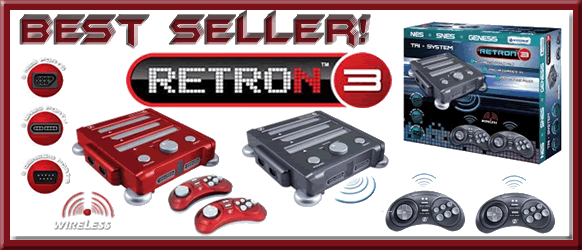This post has not been edited by the GamesBeat staff. Opinions by GamesBeat community writers do not necessarily reflect those of the staff.
 It has been several years since Denis Dyack, founder and president of development studio Silicon Knights (makers of Too Human and Eternal Darkness: Sanity's Requiem), predicted that the future of video games involved only one console manufacturer. Most gamers have likely completely forgotten about those angry forum rants they posted in response to his idea.
It has been several years since Denis Dyack, founder and president of development studio Silicon Knights (makers of Too Human and Eternal Darkness: Sanity's Requiem), predicted that the future of video games involved only one console manufacturer. Most gamers have likely completely forgotten about those angry forum rants they posted in response to his idea.
If you look at the industry today, we certainly don't seem any closer to that reality, but it just might be because you're looking in all the wrong places. Somewhere on the shelves of a dimly lit used-game store and in the furthest pages of Amazon's video games section, the one console future we were promised is growing…in reverse.
Want to play your favorite Super Nintendo game and then immediately pop in your favorite Nintendo Entertainment System cart without even changing controllers? Someone made a console for you. Hell, toss your favorite Genesis classic in the mix because multiple manufacturers have consoles that can do all three. Quality notwithstanding, smaller companies are slowly being flooded with retro console clones that operate on the idea that more is indeed merrier, but what would happen if one of the big three (Sony, Microsoft, and Nintendo) got on board? Well, they kind of have.
The Wii's Virtual Console and the ever-increasing slew of retro titles being ported by developers to PSN and XBLA are like the next step in the evolution of the one-system future. They know that we will buy all of the old games that we love again, and they are more than willing to sell them to us. The digital format is just an easier way for both parties to make the transaction. The more we show them that we're interested in owning our gaming pasts in digital form, the more they will offer it up to us.
Nintendo is the closest, having organized their retro offerings into a "virtual console", which combines numerous games from old systems like the Genesis, NEOGEO, TurboGrafx16, Sega Master System, Commodore 64, and the expected ones from Nintendo's history. Of course, the joke goes that they barely remember it exists.
What would happen if a big company were to put major funds into making the retro-gaming super console we all secretly dream of? The smaller businesses that make the current retro-combo consoles have to make their profits on the actual system. Once people buy the unit, the company isn't going to see another dime from them unless they make controllers or accessories for the thing. For the most part, though, people just buy it and then plug in their old games and controllers. That's usually one of the biggest appeals.

Come on, guys! You can fit so many more slots in that thing!
A big-name company wouldn't have the same issues at all. Imagine if Nintendo had gone a drastically different direction with the virtual console. Instead of making it a side feature of the Wii and then forgetting about it, what if they'd launched a dirt-cheap physical console completely separate from the Wii. I mean, 50 dollars, tops. They can afford any loss, but being entirely meant for digital downloads of retro games, it would probably be insanely cheap to produce any way. The day of release, it has Nintendo's entire back-catalog of games available for download as well as wireless controller replications of all of their past systems.
Done. That thing would sell like hotcakes, and everyone would be downloading all of their old favorites. Then Nintendo slaps those sales reports down on the desks of every third-party publisher and past console manufacturer. Within months, they would all have their own games available for download and fancy new wireless versions of their classic controllers.
 Now that's my kind of one-console future. And it really isn't that far-fetched. Alright, maybe Nintendo would never do that, and Sony and Microsoft might not have enough of a legacy to be able to pull it off, but it doesn't have to be one of them. Any game publisher with a big enough catalog of releases to spark initial sales of the system would be able to make it a success.
Now that's my kind of one-console future. And it really isn't that far-fetched. Alright, maybe Nintendo would never do that, and Sony and Microsoft might not have enough of a legacy to be able to pull it off, but it doesn't have to be one of them. Any game publisher with a big enough catalog of releases to spark initial sales of the system would be able to make it a success.
I can't predict exactly how it will all go down. A stand-alone system for retro releases from a major company is probably unlikely, but something is going to happen. The video game industry is rapidly evolving — faster than any other form of entertainment ever has and in that rush to find the next big thing we can sometimes forget about our past. Some advocates seek to preserve the industry's past, and this would be an amazing solution for that. It's not all about making money; it's also about saving our history. That's why we buy all those old games we love. We want to save our childhood. Because we can't just put all those magical gaming memories in a photo album. And lord knows those systems aren't going to stay functioning forever.
All of these reasons and more are why the retro, one-console future is inevitable. Embrace it. Believe in it. It is coming.
